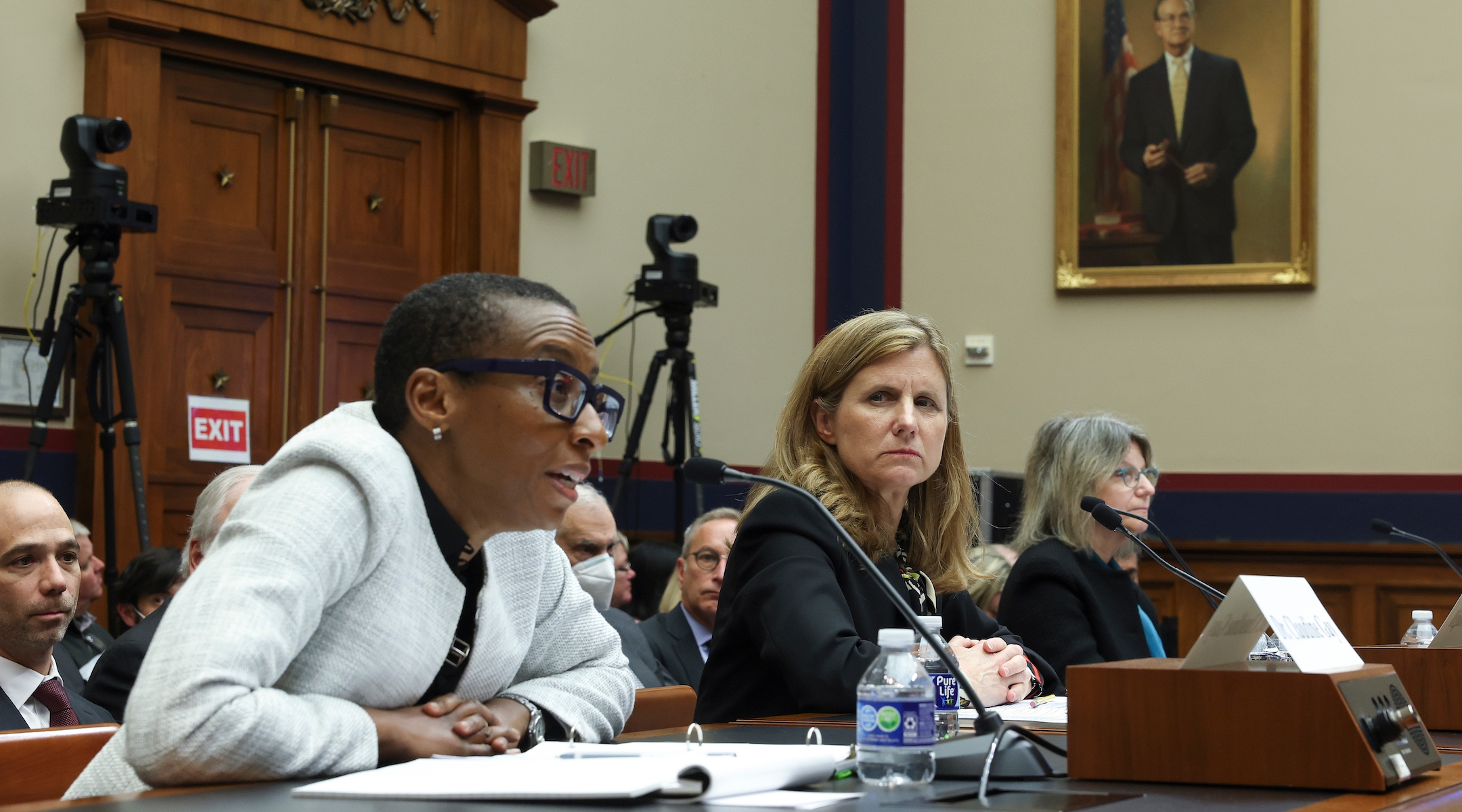(JTA) — The president of the University of Pennsylvania announced her resignation on Saturday after facing growing backlash for declining to say outright that calling for the genocide of Jews violated the school’s code of conduct.
“I write to share that President Liz Magill has voluntarily tendered her resignation as President of the University of Pennsylvania,” Scott Bok, the chair of the school’s board of trustees, said in a statement. Bok subsequently said he would also be resigning.
Bok will be replaced for the time being by Julie Platt, who is currently the board chair of the Jewish Federations of North America. Platt, currently Penn’s vice chair, will serve as interim chair of the school’s board until January.
Magill’s resignation is the most significant fallout so far from a congressional hearing on Tuesday in which she and the presidents of Harvard University and the Massachusetts Institute of Technology were all asked whether calls for genocide of Jews would constitute harassment or bullying. All three responded that the answer depended on “context.”
Video of the exchange went viral and was highlighted by Jewish and pro-Israel activists as an illustration of how universities have failed to take campus antisemitism seriously in the wake of Hamas’ Oct. 7 attack on Israel and Israel’s ensuing war against the terror group in Gaza.
“I hope this signals a new start for @Penn & a wake-up call for all college presidents,” Jonathan Greenblatt, the CEO of the Anti-Defamation League, wrote on X, formerly Twitter. “Campus administrators must protect their Jewish students with the same passion they bring to protecting all students. They can’t hide behind language coached by their attorneys & look the other way when it comes to antisemitism.”
In the wake of the hearing, Magill in particular faced mounting criticism from Penn’s stakeholders. The board of the school’s Wharton School called for new leadership for the school and a donor threatened to pull a $100 million donation unless Magill stepped down. Pennsylvania Gov. Josh Shapiro, who is a non-voting member of the board of the private university, said Magill “failed” to create a safe atmosphere for students and urged the board to review her leadership.
In her own brief statement Saturday, Magill did not mention the reason for her stepping down, and said, “It has been my privilege to serve as President of this remarkable institution.” Bok said in his statement that Magill was “not the slightest bit antisemitic” but had faltered in the hearing because she had given “a legalistic answer to a moral question, and that made for a dreadful 30-second sound bite.”
Platt, in a statement, called Magill’s resignation “necessary and appropriate.” She said the school had more to do to address antisemitism.
“As Vice Chair of the university’s board these past several months, I have worked hard from the inside to address the rising issues of antisemitism on campus. Unfortunately, we have not made all the progress that we should have and intend to accomplish. In my view, given the opportunity to choose between right and wrong, the three university presidents testifying in the United States House of Representatives failed.”
Both Magill and Harvard President Claudine Gay walked back their comments to Congress in statements the day after the hearing, and Gay issued a subsequent apology in an interview with the Harvard Crimson, the student newspaper, saying, “When words amplify distress and pain, I don’t know how you could feel anything but regret.”
MIT’s board, meanwhile, is backing its president, Sally Kornbluth, who is Jewish. “I write now to let you know that I and the Executive Committee of the MIT Corporation entirely support President Kornbluth,” MIT Corporation chair Mark Gorenberg wrote in an open letter on Thursday.
Meanwhile, Rep. Elise Stefanik, the New York Republican who asked the questions about genocide, celebrated Magill’s resignation and called for Gay and Kornbluth to follow suit.
“One down. Two to go,” Stefanik wrote on X. “This is only the very beginning of addressing the pervasive rot of antisemitism that has destroyed the most ‘prestigious’ higher education institutions in America.”
At least one other elite university has taken the opportunity to signal that its approach to antisemitism is different. “In the context of the national discourse, Stanford unequivocally condemns calls for the genocide of Jews or other peoples,” Stanford University wrote in a social media post on Friday. “That statement would clearly violate Stanford’s Fundamental Standard, the code of conduct for all students at the university.”
JTA has documented Jewish history in real-time for over a century. Keep our journalism strong by joining us in supporting independent, award-winning reporting.






